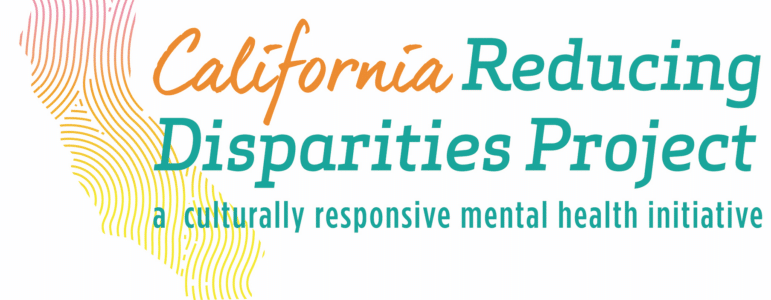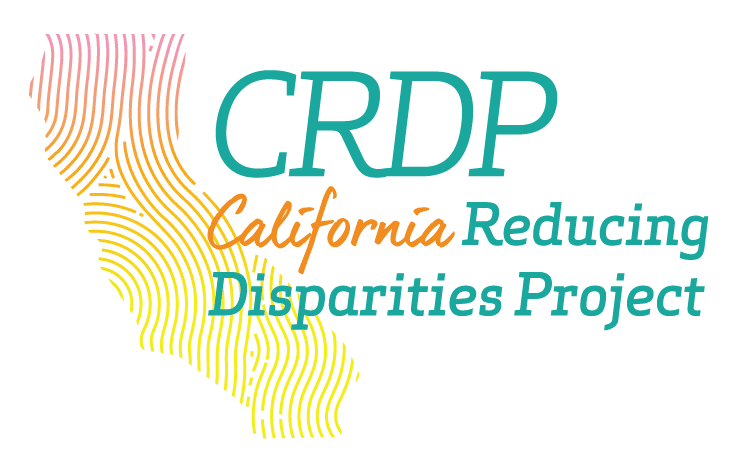The California Reducing Disparities Project (CRDP) is a first of its kind initiative intended to demonstrate the effectiveness of Community-Defined Evidence Practices (CDEPs) in reducing mental health disparities for diverse, multicultural communities and reinforce the infrastructure to deliver these services.
In order to determine the extent to which CRDP achieved its goals, the initiative evaluates:
- The extent to which the funded CDEPs reduced the severity of mental illness and improved the mental health of the five CRDP priority populations (African American, Asian Pacific Islander, Latinx, LGBTQ+, and Native American);
- CRDP’s contributions to local and statewide changes in the mental health system;
- The overall return from CRDP’s $60 million investment and the business case for local and statewide replication of the initiative’s strategies.
The CRDP evaluation, occurring from summer 2017 to summer 2021, utilizes a multimethod and multilevel approach occurring at two levels:
- Culturally and contextually grounded local evaluations of each CDEP;
- A Statewide Evaluation assessing the overall effectiveness of the initiative’s strategies and the extent to which CRDP reduced the severity of mental illness and improved the mental health of the five CRDP priority populations.
Each of the CRDP’s 35 Implementation Pilot Projects designs and implements a tailored, culturally informed local evaluation of their CDEP. All of the local evaluations incorporate a community-based participatory research approach in their design and implementation. Implementation Pilot Projects also receive evaluation technical assistance from the CRDP Statewide Evaluator and five technical assistance provider organizations, each specializing in one of the five CRDP priority populations. Although each local evaluation is different, most are mixed-methods gathering data related to project fidelity, participant mental health outcomes, and culturally based protective factors.
More information on each local evaluation is available on the Implementation Pilot Project web pages.
In contrast to the specificity of the local evaluations on individual CDEPs, the Statewide Evaluation:
- Assesses the overall effectiveness of the CRDP in identifying and implementing strategies to reduce mental health disparities for the five priority populations.
- Evaluates the effectiveness of CDEPs, as a mental health prevention and early intervention strategy, for protecting and strengthening the mental health of the five priority populations as well as developing a business case to help inform the value of sustaining and replicating this work.
- Documents CRDPs’ culturally responsive strategies for evaluating CDEPs.
The Statewide Evaluation uses a social-ecological systems framework to examine CRDP’s influence in reducing mental health disparities and improving mental health outcomes in the context of multi-level social and environmental factors. It encourages attention to risk and protective factors at several levels that influence mental health, including individual, family, peer, school, neighborhood, community, and systems.
Statewide Evaluation data sources include CDEP participant pre and post survey data; semi-annually reported organization and program core data; and key informant interview data collected annually from CRDP partners on fidelity, flexibility, and technical assistance strategies.
To align with cultural, contextual, and linguistic realities of the 35 Implementation Pilot Projects, the Statewide Evaluation incorporates an iterative development process through ongoing feedback and collaboration with other CRDP partners. The Statewide Evaluation Plan updates annually to account for changes in priorities, resources, feasibility issues, emergence of new opportunities, necessary improvements to cultural, contextual and linguistic appropriateness, etc.
More information on the CRDP Statewide Evaluation Plan is available here:
The CRDP anticipates that the Local Evaluation Final reports will be publicly available in January 2022 and that the Statewide Evaluation Final Report will be publicly available in October 2022.




